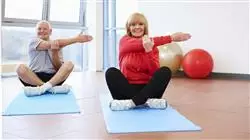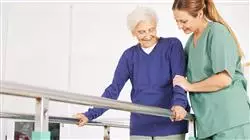University certificate
The world's largest faculty of medicine”
Introduction to the Program
Learn to recognize the most current autonomy support devices in the rehabilitation field, with the most extensive knowledge of their suitability and safe use in geriatric patients”

In the Rehabilitation Medicine field, the incorporation of devices to aid autonomy is an indispensable means of support and care for the patient. Find the most suitable ones that offer the desired advantages is not so easy. A complete assessment is needed that takes into account the characteristics of each patient and his or her actual ability to handle and adapt to the devices.
To do this, professionals must assess and explore the patient's resistance and physiological reserves in order to establish the appropriate framework for action, home care, residential care, day care centers, social centers or private clinics.
This work should include treatments for pre-frailty, frailty, pain, trauma, neurological, respiratory and/or pelvic floor disorders, gerontological syndromes or cognitive impairment, side effects of drugs and/or biopsychosocial conditions that may complicate the clinical picture.
It is therefore essential to know the tools of physiotherapy and the appropriateness of its application in each case, such as active exercise, manual therapy, electrotherapy being able to work in interdisciplinary team, with appropriate communication tools, understanding the concept of person-centered care, having the most updated knowledge of support devices and even the support of current technology, can be key to success in the treatment of physiotherapy.
A syllabus developed based on the latest information on medical aids in mobility and support for the care of geriatric patients”
This Postgraduate diploma in Application of Devices and Aids to Autonomy in Rehabilitation Medicine contains the most complete and up-to-date scientific program on the market. The most important features include:
- The development of practical cases presented by experts in Geriatric Rehabilitation Medicine
- The graphic, schematic, and practical contents with which they are created, provide scientific and practical information on the disciplines that are essential for professional practice
- Practical exercises where self-assessment can be used to improve learning
- Its special emphasis on innovative methodologies
- Theoretical lessons, questions for the experts, debate forums on controversial topics, and individual reflection assignments
- Content that is accessible from any fixed or portable device with an Internet connection
Students will learn how to perform a proper assessment that will allow the most suitable systems to be chosen for each patient with mobility problems”
The syllabus includes, in its teaching staff, professionals from the sector who bring to it the experience of their work, in addition to recognized specialists from prestigious reference societies and universities.
The multimedia content, developed with the latest educational technology, will provide professionals with situated and contextual learning, i.e., a simulated environment that will provide immersive training, designed for training oneself in real situations.
This syllabus is designed around Problem-Based Learning, whereby the professional must try to solve the different professional practice situations that arise throughout the program. For this purpose, the student will be assisted by an innovative interactive video system created by renowned experts.
With a high training methodological design, this program is created to allow students to learn in a dynamic and effective way”

Using the most efficient audiovisual systems, this Postgraduate diploma will allow students to learn through direct and realistic observation of what is learnt”
Why study at TECH?
TECH is the world’s largest online university. With an impressive catalog of more than 14,000 university programs available in 11 languages, it is positioned as a leader in employability, with a 99% job placement rate. In addition, it relies on an enormous faculty of more than 6,000 professors of the highest international renown.

Study at the world's largest online university and guarantee your professional success. The future starts at TECH”
The world’s best online university according to FORBES
The prestigious Forbes magazine, specialized in business and finance, has highlighted TECH as “the world's best online university” This is what they have recently stated in an article in their digital edition in which they echo the success story of this institution, “thanks to the academic offer it provides, the selection of its teaching staff, and an innovative learning method aimed at educating the professionals of the future”
A revolutionary study method, a cutting-edge faculty and a practical focus: the key to TECH's success.
The most complete study plans on the university scene
TECH offers the most complete study plans on the university scene, with syllabuses that cover fundamental concepts and, at the same time, the main scientific advances in their specific scientific areas. In addition, these programs are continuously being updated to guarantee students the academic vanguard and the most in-demand professional skills. In this way, the university's qualifications provide its graduates with a significant advantage to propel their careers to success.
TECH offers the most comprehensive and intensive study plans on the current university scene.
A world-class teaching staff
TECH's teaching staff is made up of more than 6,000 professors with the highest international recognition. Professors, researchers and top executives of multinational companies, including Isaiah Covington, performance coach of the Boston Celtics; Magda Romanska, principal investigator at Harvard MetaLAB; Ignacio Wistumba, chairman of the department of translational molecular pathology at MD Anderson Cancer Center; and D.W. Pine, creative director of TIME magazine, among others.
Internationally renowned experts, specialized in different branches of Health, Technology, Communication and Business, form part of the TECH faculty.
A unique learning method
TECH is the first university to use Relearning in all its programs. It is the best online learning methodology, accredited with international teaching quality certifications, provided by prestigious educational agencies. In addition, this disruptive educational model is complemented with the “Case Method”, thereby setting up a unique online teaching strategy. Innovative teaching resources are also implemented, including detailed videos, infographics and interactive summaries.
TECH combines Relearning and the Case Method in all its university programs to guarantee excellent theoretical and practical learning, studying whenever and wherever you want.
The world's largest online university
TECH is the world’s largest online university. We are the largest educational institution, with the best and widest online educational catalog, one hundred percent online and covering the vast majority of areas of knowledge. We offer a large selection of our own degrees and accredited online undergraduate and postgraduate degrees. In total, more than 14,000 university degrees, in eleven different languages, make us the largest educational largest in the world.
TECH has the world's most extensive catalog of academic and official programs, available in more than 11 languages.
Google Premier Partner
The American technology giant has awarded TECH the Google Google Premier Partner badge. This award, which is only available to 3% of the world's companies, highlights the efficient, flexible and tailored experience that this university provides to students. The recognition as a Google Premier Partner not only accredits the maximum rigor, performance and investment in TECH's digital infrastructures, but also places this university as one of the world's leading technology companies.
Google has positioned TECH in the top 3% of the world's most important technology companies by awarding it its Google Premier Partner badge.
The official online university of the NBA
TECH is the official online university of the NBA. Thanks to our agreement with the biggest league in basketball, we offer our students exclusive university programs, as well as a wide variety of educational resources focused on the business of the league and other areas of the sports industry. Each program is made up of a uniquely designed syllabus and features exceptional guest hosts: professionals with a distinguished sports background who will offer their expertise on the most relevant topics.
TECH has been selected by the NBA, the world's top basketball league, as its official online university.
The top-rated university by its students
Students have positioned TECH as the world's top-rated university on the main review websites, with a highest rating of 4.9 out of 5, obtained from more than 1,000 reviews. These results consolidate TECH as the benchmark university institution at an international level, reflecting the excellence and positive impact of its educational model.” reflecting the excellence and positive impact of its educational model.”
TECH is the world’s top-rated university by its students.
Leaders in employability
TECH has managed to become the leading university in employability. 99% of its students obtain jobs in the academic field they have studied, within one year of completing any of the university's programs. A similar number achieve immediate career enhancement. All this thanks to a study methodology that bases its effectiveness on the acquisition of practical skills, which are absolutely necessary for professional development.
99% of TECH graduates find a job within a year of completing their studies.
Postgraduate Diploma in the Application of Devices and Autonomy Aids in Rehabilitation Medicine
Technology is advancing by leaps and bounds, and the field of Rehabilitation Medicine is no exception. Today, autonomy aids and devices have become a key tool for improving the quality of life of patients with motor, sensory or cognitive disabilities. For this reason, there is a great need for specialists with up-to-date knowledge in the use of these technologies. The Postgraduate Diploma in the Application of Devices and Autonomy Aids in Rehabilitation Medicine is an excellent opportunity for those seeking to update their skills in this area. This program provides a complete and cutting-edge education on the different types of devices and aids to autonomy, as well as on their application in patients with different disabilities. In just 6 months, you will be at the forefront of this branch of Rehabilitation Medicine.
Combine your personal and professional duties with your excellent update
The Postgraduate Diploma in Application of Devices and Aids to Autonomy in Rehabilitation Medicine is developed 100% online, which allows students to study from anywhere and 24 hours a day. The program is designed by the best specialists in this medical field, who have elaborated very complete didactic contents adapted to the current needs of this field. These resources are available in a wide variety of textual and multimedia supports, giving you the possibility to adapt your study to your academic preferences. Enroll today and perfect your update in this field with the best study facilities in the pedagogical panorama!







